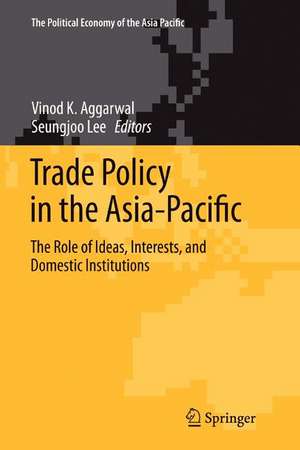Trade Policy in the Asia-Pacific: The Role of Ideas, Interests, and Domestic Institutions: The Political Economy of the Asia Pacific
Editat de Vinod K. Aggarwal, Seungjoo Leeen Limba Engleză Paperback – 27 dec 2012
| Toate formatele și edițiile | Preț | Express |
|---|---|---|
| Paperback (1) | 550.14 lei 38-44 zile | |
| Springer – 27 dec 2012 | 550.14 lei 38-44 zile | |
| Hardback (1) | 640.37 lei 43-57 zile | |
| Springer – 11 noi 2010 | 640.37 lei 43-57 zile |
Din seria The Political Economy of the Asia Pacific
- 15%
 Preț: 649.06 lei
Preț: 649.06 lei - 18%
 Preț: 1224.36 lei
Preț: 1224.36 lei -
 Preț: 389.31 lei
Preț: 389.31 lei - 15%
 Preț: 639.25 lei
Preț: 639.25 lei - 15%
 Preț: 639.25 lei
Preț: 639.25 lei - 18%
 Preț: 1222.94 lei
Preț: 1222.94 lei - 20%
 Preț: 566.75 lei
Preț: 566.75 lei -
 Preț: 385.84 lei
Preț: 385.84 lei - 23%
 Preț: 773.65 lei
Preț: 773.65 lei -
 Preț: 382.18 lei
Preț: 382.18 lei -
 Preț: 262.09 lei
Preț: 262.09 lei - 15%
 Preț: 652.17 lei
Preț: 652.17 lei - 15%
 Preț: 646.30 lei
Preț: 646.30 lei - 24%
 Preț: 631.50 lei
Preț: 631.50 lei - 18%
 Preț: 720.53 lei
Preț: 720.53 lei -
 Preț: 197.79 lei
Preț: 197.79 lei - 15%
 Preț: 637.13 lei
Preț: 637.13 lei -
 Preț: 369.48 lei
Preț: 369.48 lei
Preț: 550.14 lei
Preț vechi: 687.67 lei
-20% Nou
Puncte Express: 825
Preț estimativ în valută:
105.27€ • 110.19$ • 87.62£
105.27€ • 110.19$ • 87.62£
Carte tipărită la comandă
Livrare economică 26 martie-01 aprilie
Preluare comenzi: 021 569.72.76
Specificații
ISBN-13: 9781461427391
ISBN-10: 1461427398
Pagini: 172
Ilustrații: XII, 158 p.
Dimensiuni: 155 x 235 x 9 mm
Greutate: 0.25 kg
Ediția:2011
Editura: Springer
Colecția Springer
Seria The Political Economy of the Asia Pacific
Locul publicării:New York, NY, United States
ISBN-10: 1461427398
Pagini: 172
Ilustrații: XII, 158 p.
Dimensiuni: 155 x 235 x 9 mm
Greutate: 0.25 kg
Ediția:2011
Editura: Springer
Colecția Springer
Seria The Political Economy of the Asia Pacific
Locul publicării:New York, NY, United States
Public țintă
ResearchCuprins
East Asian International Economic Governance Strategies: the Role of Interests, Ideas, and Domestic Institutions.- Domestic Politics of China’s Asian Regionalism Policy.- The Domestic Politics of Japan’s Regional Economic Foreign Policy.- South Korea’s Dynamics of Regionalism: Hegemon, Ideas, and Domestic Institutions.- The United States and Asian Regionalism: the Politics of Reactive Leadership.- The Politics of Singapore’s Bilateral Free Trade Agreements: Enlightened Self-Interest to Promote East Asian Regionalism?- Conclusion.
Textul de pe ultima copertă
East Asian countries are now pursuing greater formal economic institutionalization, weaving a web of bilateral and minilateral preferential trade agreements. Scholarly analysis of “formal” East Asian regionalism focuses on international political and economic factors such as the end of the Cold War, the Asian financial crisis, or the rising Sino-Japanese rivalry. Yet this work pays inadequate attention to the strategies of individual government agencies, business groups, labor unions, and NGOs across the region. Moreover, most studies also fail to adequately characterize different types of trade arrangements, often lumping together bilateral accords with minilateral ones, and transregional agreements with those within the region. To fully understand this cross-national variance, this book argues that researchers must give greater attention to the domestic politics within East Asian countries and the U.S., involving the interplay of these subnational players. With contributions from leading country and regional trade specialists, this book examines East Asian and American trade strategies through the lens of a domestic bargaining game approach with a focus on the interplay of interests, ideas, and domestic institutions within the context of broader international shifts. With respect to domestic politics, the chapters show how subnational actors engage in lobbying, both of their own governments and through their links to others in the region. They also trace the evolution of interests and ideas over time, helping us to generate a better understanding of historical trends in the region. In addition to scholars of East Asian and comparative regionalism, this book will be of interest to policy-makers concerned with international trade and U.S.-Asia relations, and those interested in understanding the rich trade institutional landscape that we see emerging in the Asia-Pacific.
Caracteristici
Provides a timely discussion on the evolution of East Asian regionalism as determined by sub-national dynamics in major countries involved Focuses on the importance of sub-national players in East Asian regionalism, distinguishing among different countries’ preferences for trade initiatives Features contributions by scholars from various national backgrounds, representing a variety of perspectives Includes supplementary material: sn.pub/extras








